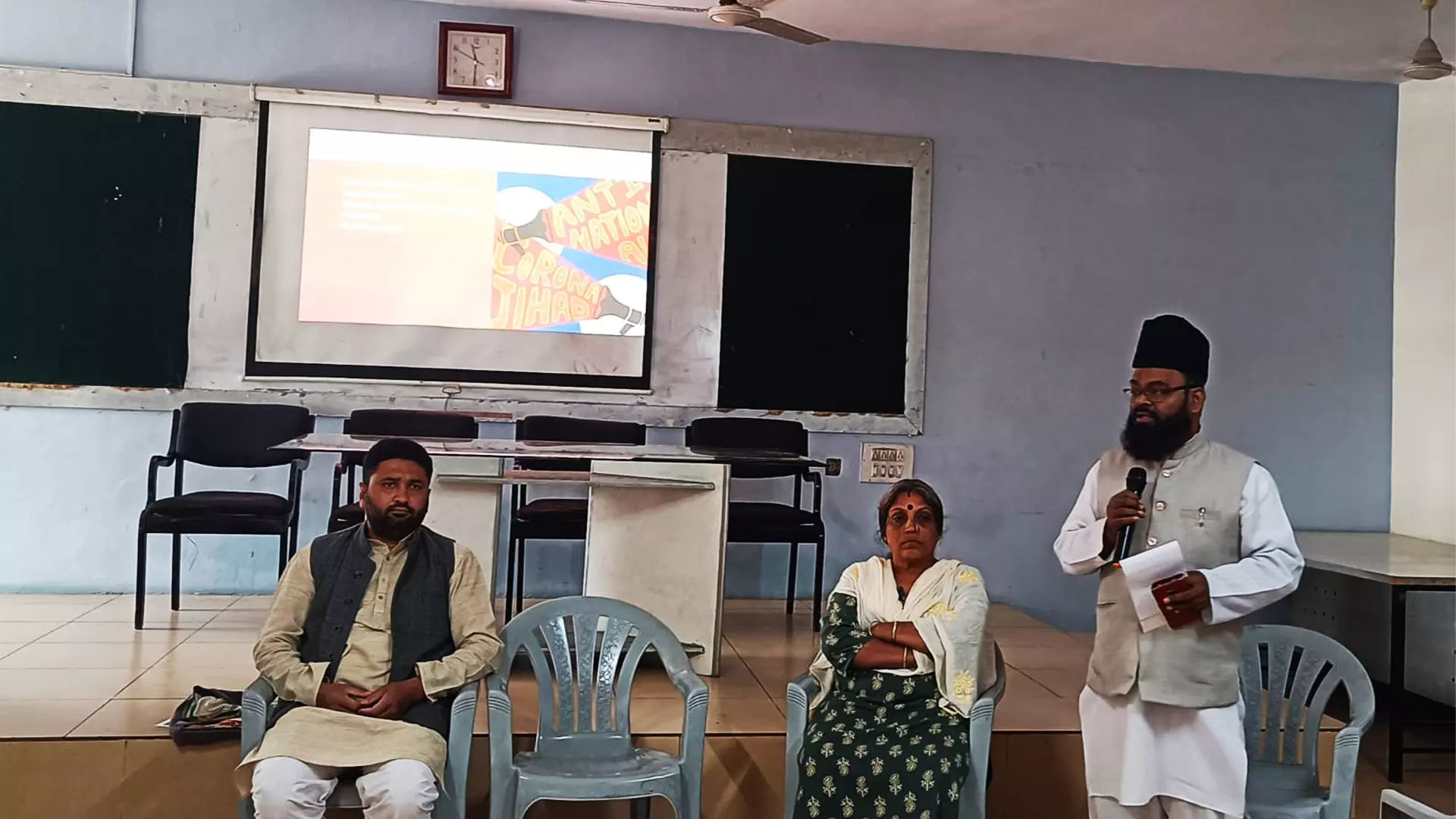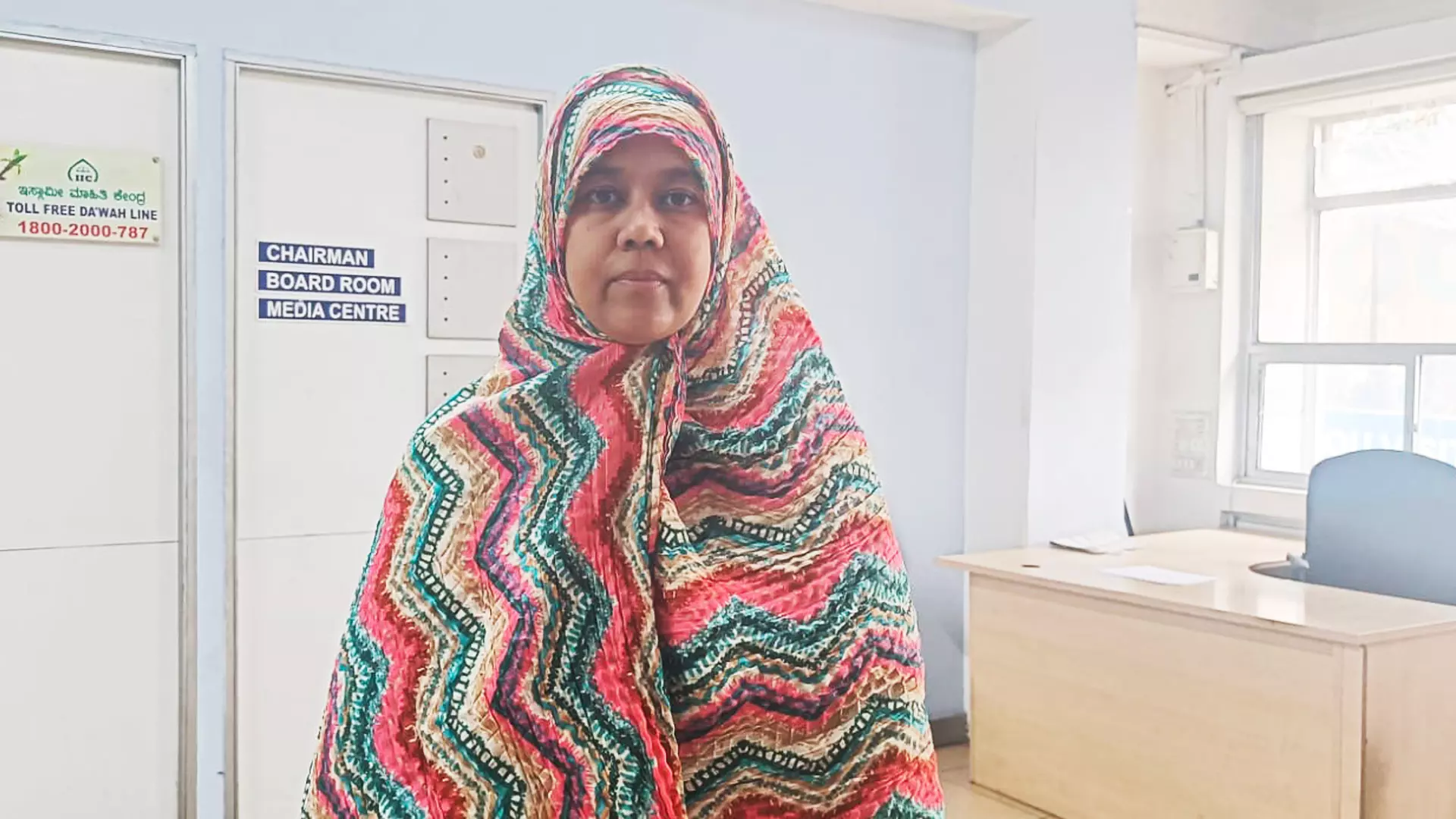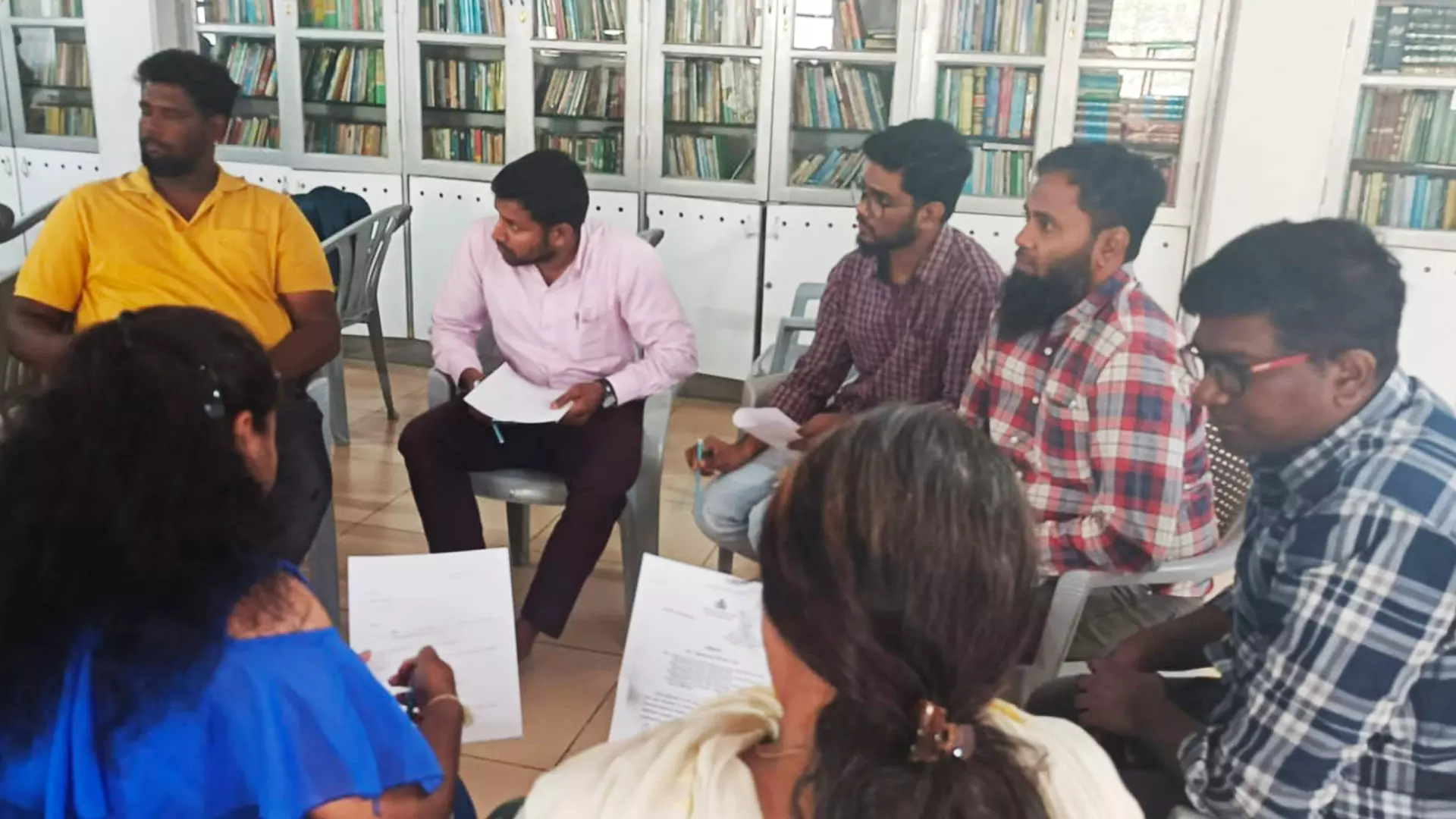
- Home
- India
- World
- Premium
- THE FEDERAL SPECIAL
- Analysis
- States
- Perspective
- Videos
- Sports
- Education
- Entertainment
- Elections
- Features
- Health
- Business
- Series
- In memoriam: Sheikh Mujibur Rahman
- Bishnoi's Men
- NEET TANGLE
- Economy Series
- Earth Day
- Kashmir’s Frozen Turbulence
- India@75
- The legend of Ramjanmabhoomi
- Liberalisation@30
- How to tame a dragon
- Celebrating biodiversity
- Farm Matters
- 50 days of solitude
- Bringing Migrants Home
- Budget 2020
- Jharkhand Votes
- The Federal Investigates
- The Federal Impact
- Vanishing Sand
- Gandhi @ 150
- Andhra Today
- Field report
- Operation Gulmarg
- Pandemic @1 Mn in India
- The Federal Year-End
- The Zero Year
- Science
- Brand studio
- Newsletter
- Elections 2024
- Events
How the silence on hate speech is leading to fear, anarchy

Mohammed Yusuf Kanni of Jamaat-E-Islami Hind Karnataka, a social and religious organisation, lamented that hate has become a pandemic dividing homes and the country.His complaint is not unfounded. If we look at the figures, hate speech has become a common phenomenon and is spreading like wildfire across the country. The communal, casteist and gender-based hate speeches have a direct...
Mohammed Yusuf Kanni of Jamaat-E-Islami Hind Karnataka, a social and religious organisation, lamented that hate has become a pandemic dividing homes and the country.
His complaint is not unfounded. If we look at the figures, hate speech has become a common phenomenon and is spreading like wildfire across the country. The communal, casteist and gender-based hate speeches have a direct social, political and cultural impact. The rise in hate speeches is causing dishonour killings, moral policing, attacks on religious places and violence against marginalised and minority communities.
The rise and rise of hate speech
According to the report on crime for 2022, the National Crime Records Bureau or NCRB there has been a 45 per cent increase in cases of hate speech. As per the report released in December 2023, the NCRB registered 1,444 cases of hate speech in 2022. There were 993 cases in 2021. In one year, India witnessed an astronomical rise of 45 per cent in cases that directly promote enmity between groups on the grounds of religion, race, gender, language and place of birth. All these cases were registered under IPC section 153 A.

Mujahid Nafees (left), Mamatha Yajaman (centre) and Mohammed Yusuf Kanni (right) during the panel discussion on hate speech. Photos: Maitreyee Boruah
Like Kanni, Mujahid Nafees, convener of the Minority Coordination Committee, Gujarat, stressed that hate speeches affect us directly. “Hate speech and fake news are related. They are the two sides of the same coin,” he added.
Nafees and Kanni spoke at a workshop on “fighting hate and building fraternity” conducted in Bengaluru, Karnataka’s capital city on Saturday.
Understanding hate speech to fight against it
The day-long event, which saw at least 50 participants from various parts of the southern state, was organised by Hate Speech Beda (Campaign Against Hate Speech), a collective to combat hate speech and build an informed citizenry. The other groups who co-hosted the programme were the All-India Lawyers’ Association for Justice, Karnataka, Dalit Sangarsha Samithi (Bheemavada), Slum Janandolana Karnataka, All India Central Council of Trade Unions, Jamaat-E-Islami Hind and Naaveddu Nilladiddare Karnataka.
Along with experts, activists, youths and citizens, the workshop deliberated and strategised methods to tackle hate speeches. “The event aims to establish a state-level group to respond to hate speeches and hate crimes. We equipped participants with the basic mechanisms required to initiate a legal response to hate speech and to complement any social response,” said Vinay Sreenivasa, an advocate and a member of Hate Speech Beda.
Politics of hate
The workshop holds significance as the country will soon vote in the upcoming Lok Sabha elections, the dates of which are likely to be announced by the Election Commission soon. Over the years, we have seen how provocative speeches by politicians (mostly belonging to the ruling Bharatiya Janata Party or BJP), especially against Muslims, have made elections in the country communal.

Sarah Mehkri was one of the participants at the workshop. She is a part of Sampark, a group that works for communal harmony.
“If a politician delivers a hate speech, he is contributing to the disintegration of the country. Hate speeches are against the country. Imagine, if our freedom fighters who fought against the colonial British rule had hate in their hearts, we would have never won our independence. Hate divides people, homes and the country," said Kanni.
"Hate is nafrat in Hindi and dewsa in Kannada. We all know hate kills love. Our Constitution speaks about love, harmony and unity. We need to protect it to survive as a nation," he added.
Nafees said as hate spreads, so thus ghettoisation. Giving an example of Juhapura, a Muslim ghetto in Ahmedabad in Gujarat where the activist himself stays, he added, “People prefer to stay in ghettos for their safety. It has its advantages but it pushes for the further marginalisation of the Muslims.”
In 2002, Gujarat witnessed one of independent India’s worst violence against the Muslim community leading to the death of more than 2,000 people, mostly Muslims. While the violent episode is usually called a riot, the activists who had worked with the victims term it as a genocide against Muslims.
Nafees said his locality is a victim of fake news and hatred. “It is called mini Pakistan to alienate the residents. The mainstream media and social media with the tactical support of the government have labelled the people of Juhapura as criminals. There are no bus services to the locality. There are no hospitals and libraries in Juhapura but there are police chowkis (outposts) every 500 metres.”
Mamatha Yajaman, a women’s rights activist belonging to the organisation Naaveddu Nilladiddare Karnataka, said hate speech disproportionately impacts women, especially Dalits and Muslims. Nafees added that in a patriarchal society like India, women invariably bear the maximum brunt of hatred as they become victims of rape.
Fighting hate in hinterlands
Several participants from different districts of Karnataka like Kolar, Dakshina Kannada, Tumkur and Davanagere took part in the workshop. They all shared how right-wing groups like Rashtriya Swayamsevak Sangh or RSS — the ideological fountainhead of the ruling BJP — and its affiliates like Vishwa Hindu Parishad or VHP and Bajrang Dal, among others, are responsible for escalating communal tensions in villages and small towns of Karnataka.
“Karnataka is a land of plurality and peace. We are trying to bring together civil society groups, activists, and citizens to demand accountability from the government (the ruling Congress) and media to preserve the constitutional promise of justice, liberty, equality, and fraternity. Towards this goal, we have organised this workshop to identify hate speech and frame our collective response to these hate speeches — including legal and ground responses,” said Shilpa Prasad of Hate Speech Beda, who is also an advocate.
“We have witnessed the direct implications of hate speech, leading to violence against communities, attacks, dishonour killings, denial of civic amenities and even denial of basic rights. Especially during the elections, hate speech is used as a tool to create hatred and garner votes,” added Manavi Atri from Hate Speech Beda, who is also an advocate.
A voice against hate
Since its formation in 2020, Hate Speech Beda has been regularly voicing complaints against hate speeches made by politicians and media houses. While it is not easy to fight against hatred targeting Muslims and other marginalised groups, its sustained work has resulted in action against those who promote enmity against others.
In 2023, the Press Council of India or PCI censured Vijay Karnataka, a Kannada newspaper, for publishing a hateful article targeting Muslims during the coronavirus pandemic. The action by the PCI was the result of a complaint by Hate Speech Beda. A censure meant that the newspaper did not get government advertisements for a certain period as a means to hold it accountable for violating the norms of journalistic conduct. Advertisement from the government is a major source of revenue for most of the media outlets in India.
In January 2023, Hate Speech Beda wrote to the Lok Sabha speaker to disqualify BJP MP Pragya Singh Thakur from the Lok Sabha as she "incited violence against Muslims during her speech" at an event in Shivamogga, Karnataka in December 2022.

The participants were divided into groups to discuss among themselves various facets related to hate speech.
'I believe in secularism'
Sarah Mehkri from Bengaluru was one of the participants at the workshop. She told The Federal, “I believe in secularism and want to fight against hatred and enmity. That is why I have joined the workshop.” Mehkri is a member of Sampark, a group that works for communal harmony.
Advocate Vinod Masearenhas from Dakshina Kannada district said that hate has seeped inside the classrooms across Karnataka. “It is a very dangerous development as we see students fighting against each other based on their religion, caste and gender,” he added.
The hijab row in Karnataka in 2022 exposed to a great extent the existence of communal division and discrimination inside educational institutions. The then BJP government of Karnataka banned Muslim female students from wearing hijab (headscarf) inside classrooms. Several Hindu students supported the ban by taking out rallies on the streets.
